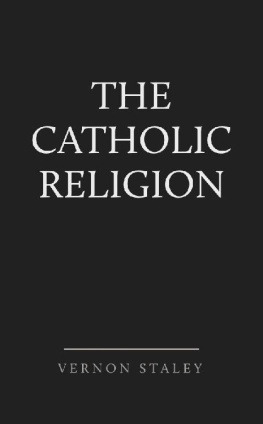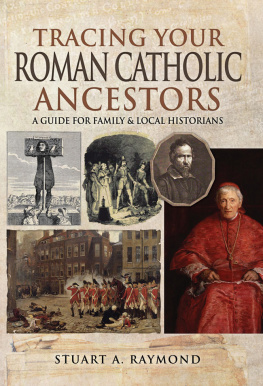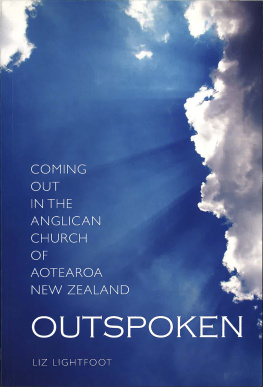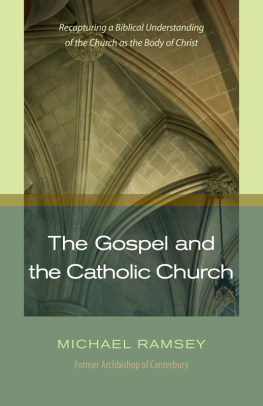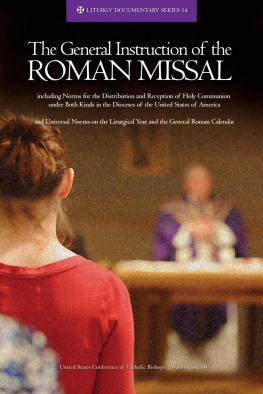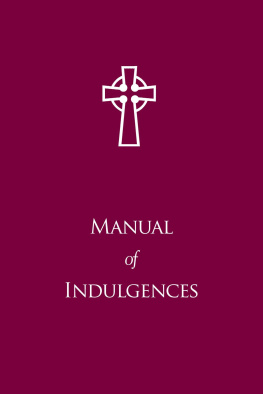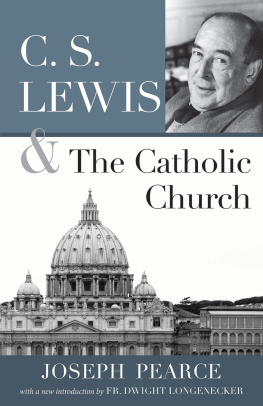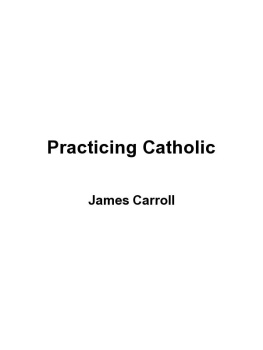The Catholic Religion
Vernon Staley
Table of Contents
Preface
MANY years before the Saxon invasion the Church entered into this country, settling itself, after that event, in Wales, where the Britons found a refuge from their enemies. Afterwards Christianity was brought to our Saxon forefathers by Augustine and Aidan and other saintly missionaries, and Alfred the Great defended the Church against the heathen Danes, till they too were received into its bosom. It has thus borne witness for God in this land during many centuries, through all changes, all crises of trial and suffering; and in its main principles it is the same now as it was at the beginning.
Although retaining a national identity, and independent history, and frequently asserting its independence, the Church was for a long period to a very great extent subject to the rule of the See of Rome; then for a time its relations with the English State were so complicated that, although its action was in theory free, it was sadly hampered by the royal claims of absolute authority. When the Puritans attained power, the whole energies of that party were directed to the suppression of the Churchs order and services. At the Restoration, its national and spiritual character was alike vindicated, but soon after it was drained of much blood through the secession of the Non-Jurors; after which ensued many years of spiritual decline. At last there came a revival through the Evangelical movement, and of late years a still greater quickening through the Oxford movement, which has stirred the whole body of the Church with new life and power. Yet during all these eventful changes the Church never lost the grace of the Apostolic Ministry, nor the Sacraments, nor the Catholic Creeds, nor even a real measure of its old constitutional government.
Moreover, the English Church has learnt valuable lessons from the various outward circumstances through which it has passed. It has retained the principle of dogmatic teaching of which Rome impressed upon it so great an example. At the revival of learning in the sixteenth century, it learned the value of free enquiry and the importance of truth on all questions, as against mere authority. It imbibed quickly the incalculable benefit of the opening of the Holy Scriptures to the people, through the invention of printing. It learnt tolerance through the terrible sufferings of persecution, itself having sorely suffered, while unhappily for a time it joined in inflicting such suffering, sharing the public feeling that prevailed everywhere at the time, that each methods were the rightful means of suppressing dangerous error. It had impressed upon it with more than ordinary power the claims of the individual conscience through the Puritan movement, of which this truth formed the main groundwork. From the Evangelical revival it acquired a deepened sense of the doctrines of grace and of the souls secret communion with God; and now the Oxford movement has brought home to us with unprecedented force the view of the Church as the mystical Body of Christ, and the consciousness of the life-giving grace of the Sacraments.
It is not difficult to see how these lessons, thus taught us, have affected the mind of the English Church, leaving their mark upon it, and giving it some of its most characteristic qualities of thought and feeling.
The greatest loss the English Church has ever known is the Wesleyan Secession. It has been often shewn how that movement arose from men with strong Church tendencies, men trained in our Universities on Church principles. But the enthusiasm which so powerfully stirred them to preach the Gospel among the masses, was at the time misunderstood, and met with no sympathy in the depressed condition of the Church, which was suffering from a long series of conflicts, ecclesiastical and civil. But the first design of these ardent mission-preachers was not to separate from the Church, rather to supplement its work; but circumstances gradually drove them on beyond their original aims, and thus the largest rent from the body of the English Church, in spite of the anxious desires of its first leaders, was unhappily consummated.
The question of the Establishment of the Church is not treated of in this volume. The question is external to the Churchs life, though its life is affected by it. But the life of the Church is the same, whether established or disestablished, and its claims upon its members are the same. The Church has been in alliance with the State in England ever since it was founded. It is this which has made the English nation to be a Christian nation, and as the faith it had received is the Catholic faith, it has thus become a Catholic nation.
This volume exhibits what I believe to be a true view of an English Churchmans faith and practice. It has been wished simply to state the truth, without attacking others. But it is impossible to make our position clear without alluding to the causes which have separated us from the Church of Rome, and which therefore imply opposition. And so likewise with regard to those who have parted from us, and formed separate communities. There has been no wish to condemn, except so far as the mere assertion of the truth we profess and the belief we hold, is itself a condemnation. We pray for reunion both with the divided portions of the Catholic Communion, and the dissenting bodies in England: we feel the sadness and the loss involved in these separations. We are conscious that there may be blame on our side, as well as on the side of those opposed to us. We can recognize their good, while we assert our own claims. We are anxious to avoid any act or deed which may aggravate the divisions that exist, and desire rather to do all in our power, as opportunity occurs, that may tend to remedy these sad troubles. We long only that the truth may prevail, and that God may be honoured by every effort wherever made to heal the breaches of His Zion.
Among the quotations made in this volume, those from the writings of Dr. Pusey will be found to be numerous. This has been done in the belief that from his great learning, his fulness of exposition, and his untiring labours, he is the most valuable witness to the Churchs truth on the various subjects which have been discussed among us of late years; and these discussions have embraced a very wide range of teaching.
I would add that definite doctrine, and a clear understanding of the truth, are of the utmost value in promoting a consistent Christian life. What we do and are, greatly depends on what we believe. Our life is the fruit of our faith. And it is surely the first duty of Church-people to learn, as fully and as clearly as they can, what the Church teaches, and what faithful men have gathered from the authorities to which the Church directs us.
That there may be a blessing on this work; that it may be found helpful to those who are earnestly seeking to live to God, and who ask for the old paths, where is the good way, and walk therein that they may find rest for their souls, is the prayer and earnest desire of the undersigned.
T. T. CARTER.
Sr. Johns Lodge, Clewer.
July 13, 1893.
Within the Catholic Church, we hold that which hath been believed everywhere, always, and of all men: for that is truly and properly Catholic, which comprehendeth all things in general after an universal manner. And that shall we do if we follow Universality, Antiquity, Consent.
Universality shall we follow thus, if we profess that One Faith to be true, which the whole Church throughout the world acknowledgeth and confesseth.
Antiquity shall we follow, if we part not any whit from those senses which it is plain that our holy elders and fathers generally held.
Consent shall we likewise follow, if, in this very Antiquity itself, we hold the definitions and opinions of all, or at any rate almost all, the Priests and Doctors together.

